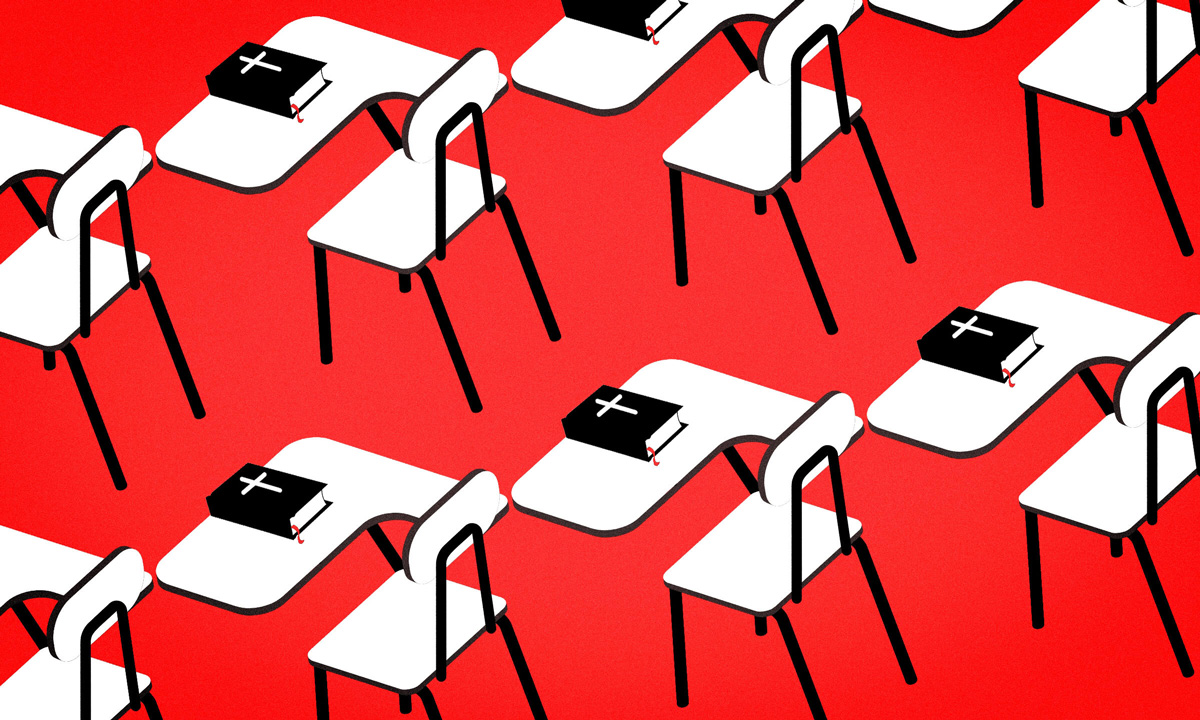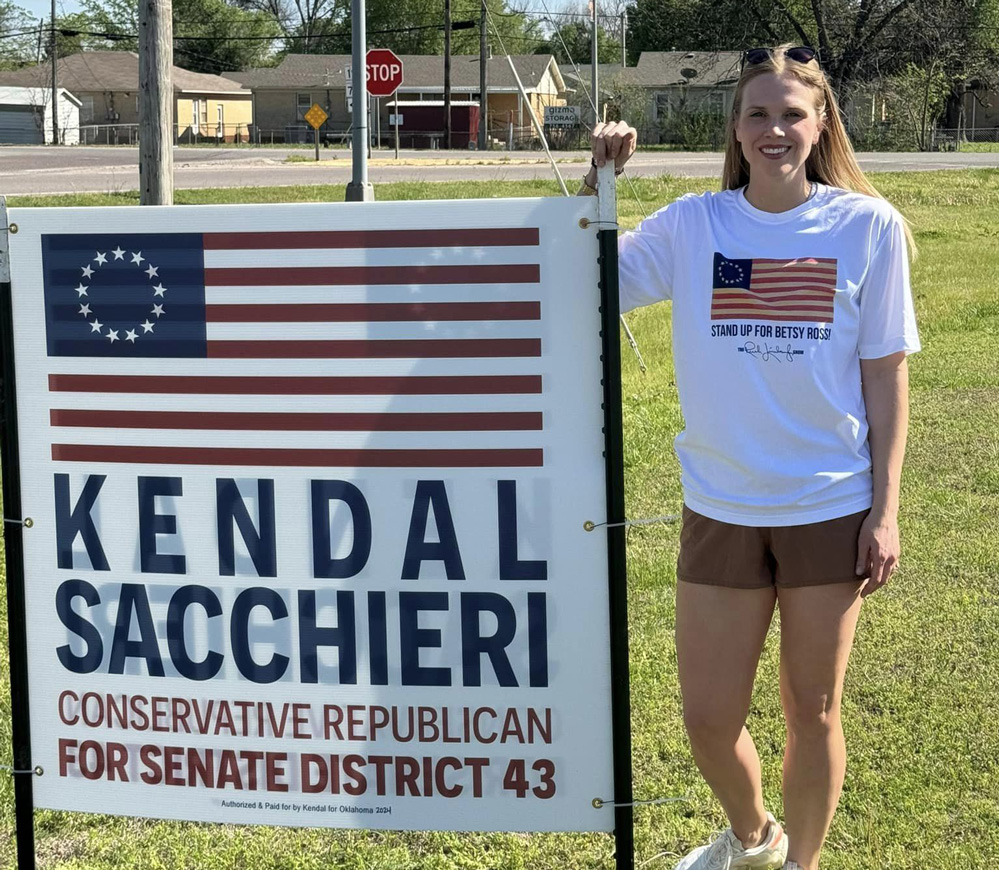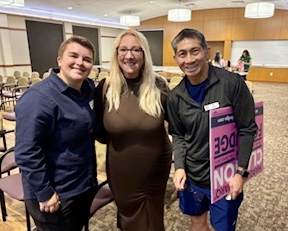Amid GOP Calls for Bible in Public Schools, Some Religious Voters are Tuning Out
One recent poll showed that the economy and immigration are top issues for churchgoers — not education.

Get stories like this delivered straight to your inbox. Sign up for The 74 Newsletter
This article is part of The 74’s EDlection 2024 coverage, which takes a look at candidates’ education policies and how they might impact the American education system after the 2024 election.
At a stop this year on his Courage Tour, a traveling revival mixing faith and politics, Dallas-based preacher Lance Wallnau warned that liberals have “taken over education,” leaving preteens confused about their gender and urging them not to talk to their parents.
He praised a new breed of “patriot pastors” who are mobilizing the faithful to engage in “biblical citizenship” by voting and getting involved on school boards. He’s among the far right religious leaders who say former President Donald Trump is God’s choice for president and that Christians should not only participate in government and politics, but take it over .

Republican leaders have spent a lot of energy this year putting those words into action. Much of the spotlight has been on Oklahoma state Superintendent Ryan Walters, who mandated that schools stock classrooms with Bibles. Louisiana passed a law requiring schools to post the 10 Commandments in classrooms, the subject of a federal lawsuit, while the Texas Education Agency has proposed a reading curriculum that includes stories from the Old and New testaments.
But the question of whether those ideas will resonate with Christian voters on Nov. 5 is harder to answer.
One recent poll suggests they might not. On a long list of concerns influencing Christians this election, public schools ranked near the bottom, with less than 30% choosing it as a reason to vote for a presidential candidate. The economy and border security topped the list for at least 60% of voters.
A lot of churchgoers are “still leery of bringing Christianity overtly into public institutions,” said George Barna, who runs the Cultural Research Center at Arizona Christian University, a small conservative college outside Phoenix. “They are more likely to desire the freedom to believe and practice their faith of choice, with their family, as they desire, without government intrusion.”
His recent poll suggests that many practicing Christians are so disillusioned by both Vice President Kamala Harris and former President Donald Trump that they may not even vote. Barna estimated that as many as 104 million “people of faith” — and of those, roughly 32 million regular churchgoers — won’t show up at the polls.
Trump tried to shore up his support among the faithful this week during a North Carolina campaign stop with conservative pastors, suggesting a failed assassination attempt against him in July was a sign. “God saved me for a purpose,” he said. Conservative leaders are counting on Christians to support their preferred candidates — up and down the ballot.
Walters co-authored an op-ed earlier this year with Steve Deace, a conservative talk show host, and David Barton, whose Wallbuilders organization teaches history from a Christian perspective. In grave terms, they urged Christians to vote for Trump if they want schools to embrace their values.
“Churches and community groups must transform into centers of evangelical activism, educating and equipping members to take a stand in this cultural and spiritual battle,” they wrote. “The election ahead is more than a political contest; it is our opportunity to affirm our commitment to our nation’s Judeo-Christian values.”
But that message doesn’t always grab voters, said Kendal Sachierri, a conservative Republican running for state Senate in Oklahoma and a former Spanish teacher. A Second Amendment advocate, she defeated an incumbent who proposed to increase penalties for having a gun on school property.

When she was going door-to-door during the primary, Sachierri said she talked to voters who were unhappy with public schools.
“But no one was like, ‘We need Bibles in the classroom,’ ” she said. When she taught at Newcastle High School, south of Oklahoma City, she had both English and Spanish versions of the Bible available for students. “Did I ever make a kid use it? No.”
‘Biblical foundation’
In local races this year, there have been signs that the public’s support for candidates who align with fundamentalist Christian groups is waning. School board hopefuls backed by Moms for Liberty haven’t fared nearly as well in primary races as they did two years ago when they earned school board seats across the country.
The organization primarily advocates against lessons on gender and sexuality, but their summit last year also featured Tim Barton, David Barton’s son and Wallbuilders president. He preached that America’s survival depends on rebuilding its “biblical foundation.”
Whether Christian voters have tired of such rhetoric enough to stay home on Election Day is hard to forecast, said Michael Emerson, a religion and public policy researcher at Rice University.
“Attempting to estimate who will vote and who will not is unreliable,” he said. “As we have seen in the past, especially with Trump, people often say they are not voting, or not voting for him, to pollsters, but then go ahead and vote for him.”
Christians, in fact, have an outsized impact on elections, he said.
That’s especially true in Texas, where religion and politics frequently mix. In conservative communities, it’s almost expected that a candidate’s platform will include references to Christianity, said Calvin Jillison, a political scientist at Southern Methodist University in Dallas.
“If you’re in a red district, you better be able to speak about these issues in a way that you know voters will respond,” he said.
The state’s official GOP platform calls for schools to require instruction from the Bible, and wealthy conservative donors have thrown their support behind candidates who espouse a “biblical worldview” in public schools.
They include state school board candidate Brandon Hall, a political newcomer who wants to emulate Walters’s effort in Oklahoma to purchase classroom Bibles.
“This is amazing. Let’s do it in Texas!” he wrote on Facebook.
For Hall, who identified himself as a pastor in campaign documents but also works for a finance company, promising to promote conservative Christian values in schools was a winning strategy. He sailed past a 22-year incumbent in the March primary with over 53% of the vote in a Fort Worth-area district.
Since then, he’s been busy promoting the Texas Education Agency’s new K-5 reading curriculum that features Bible stories and emphasizes the evangelism of the nation’s founding. As The 74 first reported in May, critics say it doesn’t reflect the religious diversity of Texas students and borders on proselytizing. (Wallnau has urged his 104,000 followers on X to ask state board members to vote for it next month.)
“Why do liberals hate the new curriculum so much? Second graders will learn courage through the story of Queen Esther,” Hall posted in September after speaking to a community group about the program.

Hall didn’t respond to voicemails or messages on Facebook — and hasn’t participated in candidate interviews with local media.
“Maybe he’s not concerned,” considering the makeup of the board has shifted more to the right in recent years, said Rayna Glaser, his Democratic opponent.
But as she attends campaign events and house gatherings to meet voters, she’s hoping that Christians will consider what could happen if the public school curriculum becomes subsumed by theology.
“We’ve got the Quran. We’ve got the Book of Mormon. Do you want Satan in there? Because I know you don’t want Satanism being taught in school,” she said. “As a Christian woman who believes in God and believes the Bible, I feel like if you open [schools] to one, you really have to open them to others.”
Get stories like these delivered straight to your inbox. Sign up for The 74 Newsletter

;)
